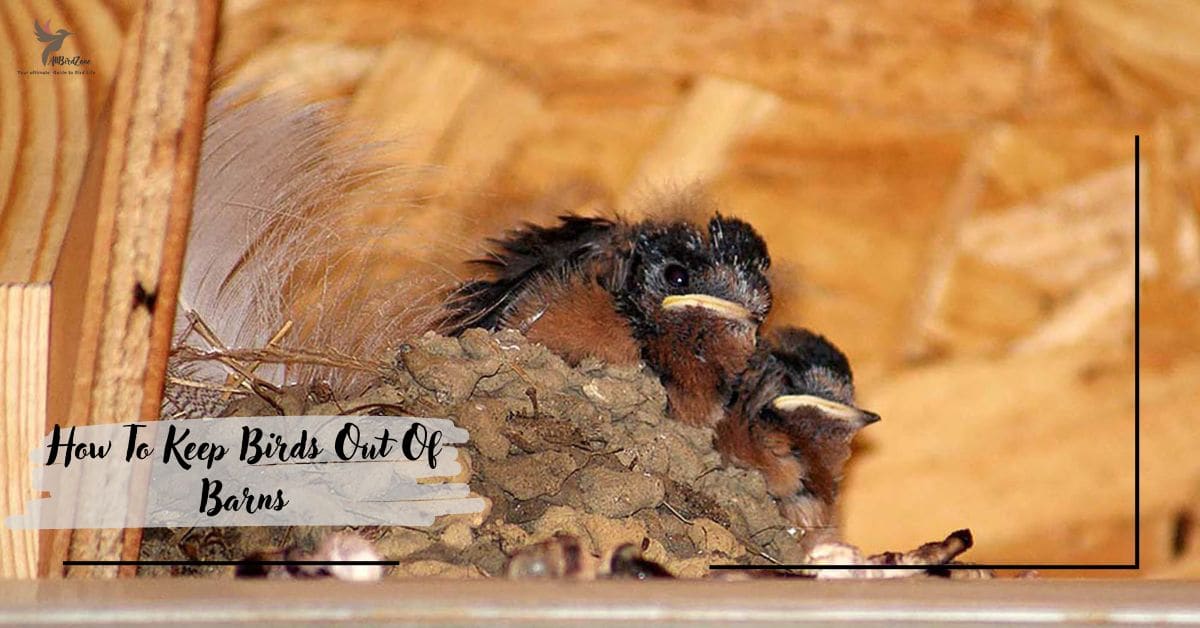How To Keep Birds Out Of Barns? I found that using bird netting and reflective tape around my barn made a big difference. Keeping the barn clean and sealing any gaps also helped keep the birds away effectively.
To keep birds out of barns, use bird netting, spikes, and shiny tape to block their entry. Hang scare balloons and play bird distress calls to make them stay away. Keep the barn clean, seal any gaps, and consider using bird gels or trained raptors for extra help. These steps will effectively keep birds from causing problems in your barn.
What Problems Do Birds Cause in Barns?
Health and Safety Concerns:
Birds carry diseases like Salmonella and Avian Influenza, which can spread to livestock or even humans. Their droppings can also contaminate food and water supplies, creating health risks.
Property Damage:
Birds peck at wood, insulation, and wiring, leading to structural damage. This can be expensive to repair and might create unsafe conditions in the barn.
Feed Contamination:
Birds are attracted to animal feed and can easily contaminate it with their droppings or feathers, leading to wastage and potential health risks for the animals.
Noise and Disruption:
Birds can be noisy, especially during mating seasons. Their presence can disturb the peace in the barn, causing stress to the animals, which can impact their well-being and productivity.
Why Is It Important to Keep Birds Out of Barns?
Keeping birds out of barns is important for a few key reasons. First, it helps keep your animals healthy by reducing the chance of spreading diseases that birds can carry. Second, birds can damage the barn by pecking at the wood and other materials, leading to expensive repairs. Third, birds can make animal feed dirty with their droppings, which can make the feed unsafe to eat. Lastly, birds can be noisy and disruptive, which can stress out your animals. By keeping birds out, you create a safer, cleaner, and calmer environment for your livestock.
When Should You Start Bird Control in Barns?
Bird control should begin as soon as you notice any signs of birds in or around your barn. If you spot bird droppings, nests, or hear birds inside the barn, it’s a clear signal to take action. Early detection is crucial because it helps prevent a small issue from turning into a bigger problem. Ideally, bird control should start during the construction of the barn, but if you notice bird activity later, it’s important to act quickly. Early intervention can save you time and resources. Start with simple steps like sealing any gaps or openings and using deterrents to keep the situation from getting worse.
How to Keep Birds Out of Barns – Effective Methods!
Using Physical Barriers:
To keep birds out, use netting to cover windows, vents, and other openings. This stops birds from flying inside while letting air flow through. Bird spikes can be placed on ledges and beams. These spikes make it hard and uncomfortable for birds to land, which helps keep them away.
Implementing Visual Deterrents:
You can scare birds away with reflective tape. Hang this shiny tape around the barn, and its movement and glare will make birds want to stay away. Scare balloons with big, scary eyes can also help. They look like predators and make birds think there’s danger. Additionally, decoys like fake owls or hawks can be set up to make birds think a predator is nearby, keeping them away from the barn.
Applying Sound Deterrents:
Ultrasonic devices make high-frequency sounds that birds don’t like but people and animals can’t hear. These sounds make the barn an uncomfortable place for birds. Another option is to play distress calls of other birds. This makes birds think there’s danger, so they will avoid the area.
Modifying the Barn Environment:
Keep the barn clean by removing food sources. Clean up any spilled feed and store food in sealed containers to stop birds from being attracted. Also, regularly seal entry points like gaps and holes in the barn. This prevents birds from finding ways to get inside.
Seeking Professional Solutions:
For extra help, use bird gels or repellents. Apply these sticky gels to surfaces where birds perch. Birds don’t like the sticky feeling and will avoid those areas. In some cases, you can use trained birds of prey. These trained raptors can scare away other birds naturally, as they act like real predators.
Which Bird Control Methods Are Best for Long-Term Success?
Combining Different Techniques:
Use a mix of physical barriers, visual and sound deterrents, and environmental modifications for the best results. No single method is usually enough; a combination approach is more effective.
Regular Maintenance and Monitoring:
Regularly check the barn for new entry points, damaged barriers, and bird activity. Keeping up with maintenance ensures that your bird control methods remain effective.
Choosing the Right Tools and Products:
Invest in high-quality bird control products that are proven to work. This includes durable netting, reliable sound devices, and effective repellents.
What Are Common Mistakes to Avoid in Bird Control?
- Ignoring Early Signs: Don’t wait until the problem becomes severe. Act quickly when you first notice birds around your barn.
- Using Ineffective Methods: Some methods, like scarecrows or fake owls, may lose effectiveness over time. Ensure that the methods you use are proven to work and keep updating them as needed.
- Not Maintaining Control Measures: Bird control requires ongoing effort. Regularly inspect and maintain barriers, deterrents, and other measures to keep birds at bay.
Frequently Asked Questions:
What types of birds are most likely to cause problems in barns?
Common problem birds in barns include pigeons, sparrows, starlings, and crows. These birds are often attracted to barns because of available food and shelter.
Can bird droppings harm my livestock?
Yes, bird droppings can carry diseases and parasites that can be harmful to livestock. They can contaminate feed and water, posing health risks to animals.
How can I tell if my barn is attracting birds?
Signs that birds are being attracted to your barn include seeing droppings, finding nests, hearing bird calls or chirping, and noticing birds flying around or entering the barn.
Are there any eco-friendly methods to keep birds out of barns?
Yes, eco-friendly methods include using natural deterrents like predator decoys, reflective tape, and bird gels that do not harm the birds but encourage them to stay away.
How often should I inspect my barn for bird control issues?
Regular inspections should be done at least once a month or more frequently if you notice signs of bird activity. Regular checks help to address any new issues quickly.
Can I use homemade bird deterrents?
Yes, homemade deterrents can be effective. Simple solutions like hanging aluminum foil strips or using DIY scarecrows can help deter birds, though they may need regular updates to remain effective.
What should I do if birds have already nested in my barn?
If birds have nested in your barn, carefully remove the nests while wearing protective gear. After removal, reinforce your bird control measures to prevent future nesting.
Are there any legal restrictions on bird control methods?
In some areas, there may be regulations regarding the treatment of birds, especially if they are protected species. Check local wildlife laws to ensure that your bird control methods are compliant.
How can I keep birds out of large barns or warehouses?
For large barns or warehouses, a combination of methods is often most effective. This might include installing netting, using multiple types of visual and sound deterrents, and regularly monitoring the area.
Do bird control products require maintenance or replacement?
Yes, many bird control products, such as netting and deterrent devices, need regular maintenance and occasional replacement to ensure they remain effective. Check them periodically and make necessary adjustments.
Conclusion:
Keeping birds out of barns is important for protecting your livestock, feed, and property. By using a mix of physical barriers, visual and sound deterrents, and maintaining a clean environment, you can effectively prevent bird problems. Regular checks and updates to your bird control methods will help keep your barn safe and comfortable for your animals.








